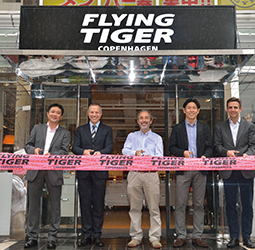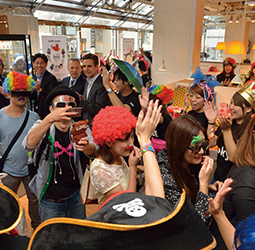Home > Highlighting JAPAN >Highlighting Japan January 2015>Opening the Doors to Overseas Businesses
Highlighting JAPAN


Tiger in the House
Renowned for its wildly popular Scandinavian household goods that combine excellent taste with bargain prices, Flying Tiger Copenhagen has leveraged knowledge of Japan’s business style, culture and creativity as it evolves into a global company.
The Danish corporation Zebra’s Flying Tiger brand of housewares had long been focused on the European market, but in 2012, seeking to become a global corporation, the company opened a store in Osaka—its first in the Asian region. The company has since expanded to 24 locations in Asia, and its future looks solid: as of November 2015, there are 577 Flying Tiger shops in 27 countries. Zebra Japan’s marketing director, Hideki Tsugeno, spoke about why the company chose Japan as its first step outside Europe and the advantages of expanding its business here.
Recognized for its reasonable prices, Flying Tiger offers affordable items concentrated in the 200 to 400 yen price range. In Danish, “tier” is slang for a 10-kroner coin (worth about 180 yen as of December 2015), and the similarity in pronunciation led to the name “tiger.” Flying Tiger initially sold itself in Denmark using a “get it cheap” brand identity. Gradually, however, the brand also developed a strong design aesthetic, and expanded its product line to a host of categories, from interior decoration to kitchen products and groceries.
“I think all the positive aspects combined—Scandinavian design, ease of purchase, uniqueness, the pop aesthetic—made it easier for us to expand into the Japanese market,” Tsugeno says. “When our store in Tokyo’s Omotesando district opened, it was the talk of the neighborhood and had long lines every day. Even now there are ten or more people waiting for the store to open up in the morning. Our success in Japan has created a strong impact on Asia overall—we’re getting more and more requests for stores throughout the region. We also see tourists visiting Japan from other Asian nations where we don’t have a presence yet coming to our stores to buy gifts.”
Zebra has long considered Asia a primary market, Tsugeno adds, and from its standpoint as a retailer determined that Japan offered a sophisticated, diverse market hospitable to overseas brand expansion. Japan has a distinctive level of service and way of doing business, and a reputation for being a difficult market in which to succeed. But Zebra saw these as learning points, and determined that taking the principles of the Japanese market to heart and bringing them home would contribute greatly to its global expansion plans.
“We’re discovering that Danes have a lot in common with the people of Japan, such as living in a country surrounded by the sea, as well as a strong national culture,” Tsugeno states. “At the same time, Danes have a powerful interest in Japanese culture and design, and we’re trying to incorporate their essence into our products. We sell teapots for black tea that are designed like small Japanese teapots and sumo wrestler battle games in our locations worldwide. We like the sense of simplicity inspired by nature—that’s at the heart of why Scandinavian and Japanese design have been accepted and enjoyed popularity in our respective countries.”
Japan is home to a great many stores selling high-performance, high-quality housewares, so it’s difficult to win consumer hearts here with merchandise that is merely inexpensive. In Japan, Tsugeno says, Flying Tiger’s largest customer base consists of women from 25 to 45 years old, and its best-selling products are household items that offer a cute pop sensibility.
“Our main focus is on everyday household goods designed with the idea of making daily life a joy, and putting smiles on customers’ faces,” he says. “We’re also expanding into products focused on art and creative ventures, such as a photo collection produced in collaboration with Yoko Ono. There’s a tendency among Japanese to treat being creative as an extraordinary thing, but I believe it’s really an integral part of our everyday llives, and that the Japanese are a more creative people than we give ourselves credit for.”
In taking its operations global, Flying Tiger Copenhagen is seeking not only to expand its business but also to make the world a happier, more expressive place.
© 2009 Cabinet Office, Government of Japan








